We still don't need a "Joe Rogan of the left." We just need a thousand Pink Poster Clubs
I regret to inform you that you and your neighbors are more powerful than you could ever imagine
Let’s start with a thought experiment.
Picture a politically influential space. The kind of arena where Overton Windows are pushed, movements are born, and important people shape our collective lives. Where does your mind go? To the dais at a political convention? A smoke-filled back room? A teeming sea of demonstrators in the streets? A podcast studio?
It’s a leading question, but still. You probably didn’t picture an automotive-themed brewpub in Evanston, Illinois. Or more to the point, you probably didn’t picture a crowd of forty-or-so mostly Millennial women gathered in a corner of that brewpub, underneath the big screen televisions and the Northwestern University pennants, hugging, decompressing, constructing buttons and anti-ICE whistle kits together. You probably didn’t picture Pink Poster Club.
This time last year, Pink Poster Club didn’t exist. Do you remember what life felt like, in late November, 2024? Just a metric ton of the worst possible vibes. There was no joy in left-liberal America, just despondency and think pieces. The right was ascendent. The bros were shouting middle school slurs without fear of recrimination. Fingers were pointed. Who was to blame, for a second round of Donald Trump, Triumphant? Was it the Democratic Party? The wokes? Joe Biden? Kamala Harris? Our neighbors, for drifting rightward? The podcast boys? Was this all Joe Rogan’s fault? Or was the problem an insufficient number of Joe Rogans? Like, you know, leftist Joe Rogans? What if we just had a few of those, and they were really good at their jobs, and they promised never to say Latinx? Would they save us? Our own fellas with microphones? Surely that must be the answer.
As is always the case, the real story wasn’t in the hot takes. Because even then, as we were told that the conservative vibe shift was complete and resistance was both cringe and futile, something else was brewing. Across the country, groups of people turned towards one another. Not in retreat, nor in pursuit of more hermetically sealed bubbles, but with weary hearts and a set of hopeful but timid questions. “What if community is the answer?” “What would happen if we built spaces where we felt less alone?” “Would that be navel-gazing, or the opposite?” “Would loving each other make us bolder, stronger, more likely to step out of our comfort zones?”
It’s easy to underestimate groups like this. We’ve been trained by Great Man narratives of history to downplay the potential impact of grassroots efforts, particularly those disproportionally led by women. This is, of course, deeply ahistorical (look under the hood at virtually every successful American social movement— both progressive and reactionary— and you’ll find that they’ve been fueled by moms and grandmas), but not surprising. Systems of domination are upheld through tricks of attentional sleight-of-hand. In February, we were trained to look in one direction, at Elon Musk’s antics, and not at the pair of suburban moms hanging up anti-Musk flyers around Evanston’s commuter rails stops.
That’s Pink Poster Club’s origin story, by the way. Its founders, Emily Miller and Savanna Essig-Fox, were pissed off, heartbroken and preemptively exhausted. They weren’t delusional. They didn’t believe that hosting book clubs, park hangs, family rallies, and happy hours would single handedly bring down a regime, but they recognized how each tiny step made them feel. Less powerless. Or more importantly, less alone, because that’s the thing about putting your own political body in motion, publicly. If you do it consistently enough, other people will find you.
Just as it’s popular to belittle grassroots efforts led by women, trans people and anybody who isn’t a white man with a megaphone, so too is it easy to downplay the efficacy of groups that already share a value system. What, it could be argued, can be accomplished by a bunch of liberals coming together in a deep blue city like Evanston, a place where Democratic candidates routinely win 80% of the vote and the City Council passed one of the nation’s more ambitious attempts at racial reparations?
I have an answer to that question, and so do Miller and Essig-Fox, but before dismissing it out of hand, it’s worth acknowledging the core truth behind that skepticism. Every organizing effort is a leap of faith. There’s no guarantee that anything we try together will actually bear fruit. When Pink Poster Club first walked the streets of Evanston with fluorescent flyers, they had no idea whether anybody would notice. They didn’t know that the kind of political education that is their bread and butter— Instagram reels about deceptively simple-sounding topics like how to sustain community and why getting to know your neighbors matters— would feel so revelatory to so many. They didn’t know that their commitment to share every call to action that came their way– mutual aid efforts, boycotts, food drives, upcoming city council hearings– would actually be heeded. They didn’t know that their efforts would inspire their neighbors to become regulars at school board meetings or to schlep downtown for protests they otherwise would have avoided.
Most of all, they didn’t know how their community would respond when ICE came to town.
That’s the thing about keeping a community both connected and in motion. History comes for ordinary people all the time. So thank goodness that—when the Trump administration’s war on immigrants descended on Chicagoland this fall— Pink Poster Club members were ready. They’d be the first to tell you that they weren’t the leaders of the immigration rights movement in their city, nor were they its only active volunteers. But it’s undeniable that they were a key backbone. When the gun thugs circled schools with automatic rifles, poster clubbers were there, filming. When the Black SUVs terrorized landscaping crews, they were there too, blowing whistles, spreading the word in two languages. When more volunteers were needed to fill in shifts, Miller and Essig-Fox put out call after call, and each time, Evanstonians answered.
And then, when the thugs’ fickle attention turned towards other cities, moms in North Carolina knew who to contact with advice. Miller and Essig-Fox soon found a new set of question-askers (and a new set of questions) in their Instagram DMs. How do we put together whistle kits? What does it take to organize walking school buses? We saw what you all did in Evanston, and what your neighbors did across Chicago, how can we do it here?
As of this writing, ICE is still in Chicago, but the regime’s performative show of force has temporarily shifted to warmer cities. If Pink Poster Club was only capable of mobilizing in the most heightened moments, you’d have expected its event last week to be one of its smallest. After all, the holiday season has arrived in full force. Essig-Fox and Miller had already asked so much of their neighbors. The cortisol rush that comes from fascists openly patrolling your town’s schoolyards had subsided.
But when I showed up at last Thursday’s happy hour at Double Clutch Brewing, I didn’t find a weary group of true believers huddled around a tiny table. I found dozens of friends and strangers laughing, loving and processing what they had just weathered together. I heard some of the deepest conversations about organizing I’ve encountered in years, all from people who wouldn’t have called themselves organizers a few months previously. I saw Rubbermaid containers jammed to the brim with whistle kits and winter coat donations. Like every Pink Poster Club gathering, it was a place to come in from the cold and do one more thing, together.
The event was supposed to end at 9:00 PM, but it was well after 10:00 when Miller brought the last box of supplies to her car. Earlier that evening, as I praised everything that she and Essig-Fox had built, she kept returning to the same theme. “But it’s so simple,” she assured me. “When I’m talking to my husband late at night, that’s the question I keep returning to. Nothing I’m doing, nothing I’m helping people do, is that hard or complicated. So why aren’t more people just doing it?”
I recognize that question. I’ve asked it a million times myself. But both she and I know the answer.
The world remains unnecessarily cruel and imperfect, but not because the steps to build a better one are beyond our collective imagination. That’s just the lie we’ve been told. What Pink Poster Club is doing is all any of us need to do. Find your people. Hold them close. Encourage them to care for something beyond themselves. Make it easy for them to do so. Thank them when they show up, and reissue the invitation when they don’t. Keep moving forward, your arms outstretched.
Some days, most days, it won’t feel like enough. But then, when you least expect it, the world will come to your doorstop. Perhaps with a terrible threat to which you need to respond. Or perhaps with an opportunity (a generational candidate, or an organizing campaign that starts locally but will soon reverberate across the world). And that moment will be seizable, but not by a random assortment of individuals. By a community. Your community. The one you held together, one event at a time.
If you ask Emily Miller and Savanna Essig-Fox, they’ll assure you that they aren’t special. They’re being overly humble. They are, I can assure you, brilliant, sophisticated and truly excellent at what they do. But they’re not lying. The most beautiful thing about Pink Poster Club is that you too can start your own version of it tomorrow. Just text a friend. Say “I know this must sound crazy, but what if…” Then do it, together. First one time, then again. Each time, extending the invitation to a few more people. Each time, being immensely grateful that they showed up. Each time, with the promise that there will be a next time.
`
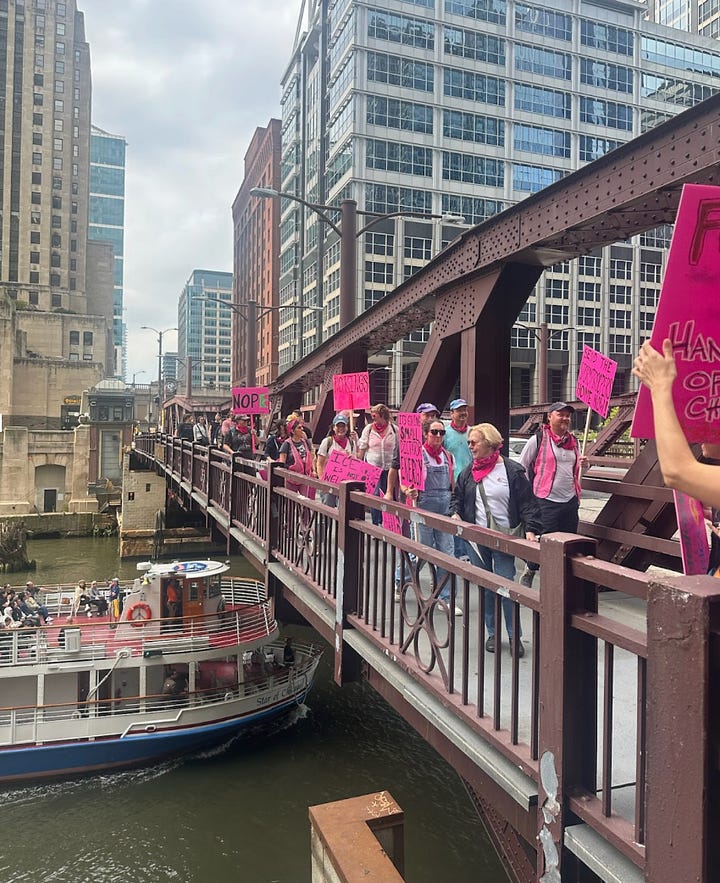
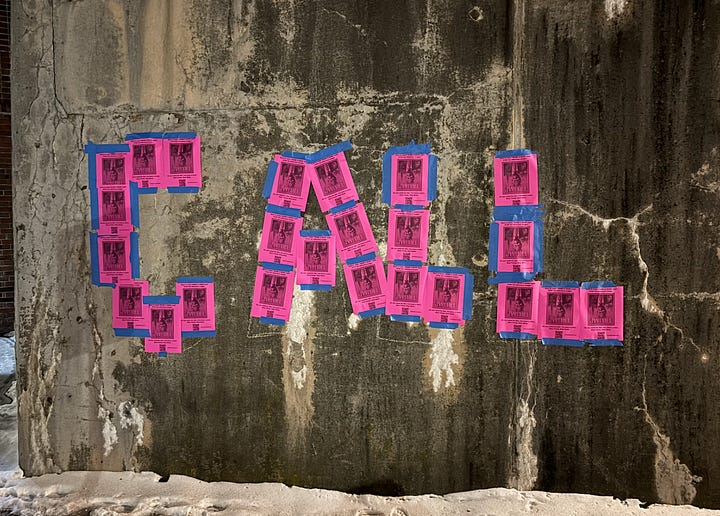
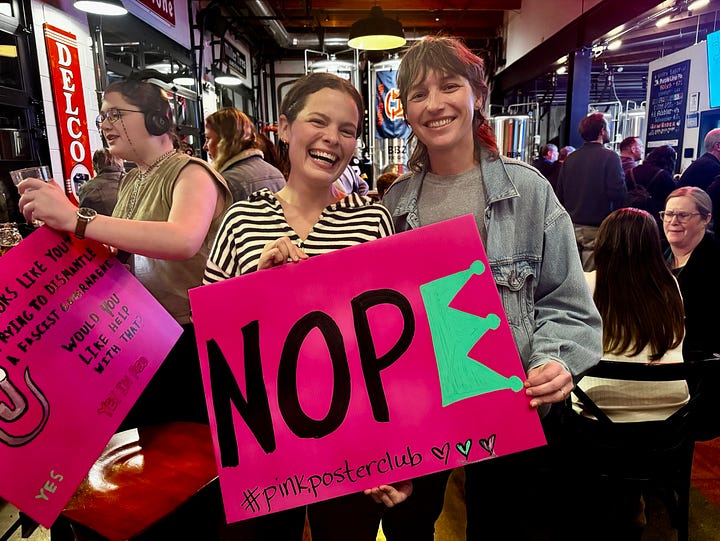
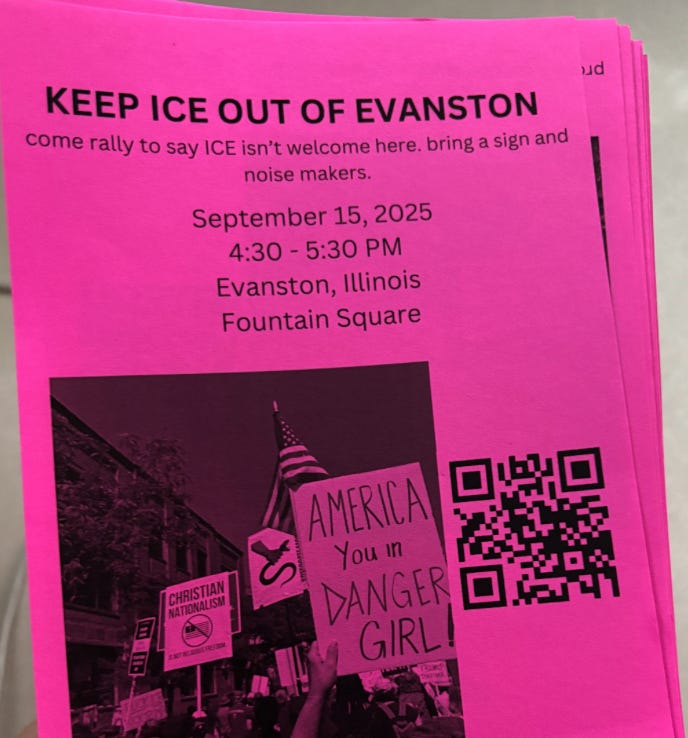
End notes:
Want more from the Pink Poster Club crew? You can sign up for more information on their website (check out the upcoming events, and mark your calendar for a Congressional candidate forum they’ll be hosting on February 19th). If you’re on Instagram, both their group account and their founders’ individual accounts are must follows.
You know what’s the worst two week stretch of the year for people who send emails for a living? We’re in it, baby. And yes, I don’t take it lightly that you allow me into your inbox, both during an American holiday week and its partner, The Week Of The Cursed Emails. So thank you for being here. As for those of you willing and able to toss in a few bucks to keep this space going, my gratitude is basically infinite. I was explaining this to my in-laws last night, actually. “The good news about my job is that it’s sorta sustainable. The bad news is that’s only the case if I literally make these little calls to action at the end of every issue.” With that in mind, I’ve got a new thank you giveaway for the rest of November. For paid subscribers (new and old), I’m offering some soon-to-be limited edition Barnraisers Project tote bags (I don’t plan on printing more with this design, not because I don’t love it, but because change is good). If you want one, either become a paid subscriber (or remind me that you are one) and then send me a “tote bag, please” email. This is just through the end of November, though. So you know, um, get like a turkey and hop to it? Is that the saying?
You’ll notice that this isn’t one of those “how to talk to your relatives about _______ for Thanksgiving” essays. Want my official take on all that? And also my official take on Zohran’s meeting with Trump? And you also want to watch me do laundry while wearing a Factory Records shirt? Here it is on Instagram, Substack, and Tik Tok (a real choose your poison situation if ever there was one).
Wait, is Pink Poster Club’s name a reference to….? Of course it is! Which brings us to THE SONG OF THE WEEK!



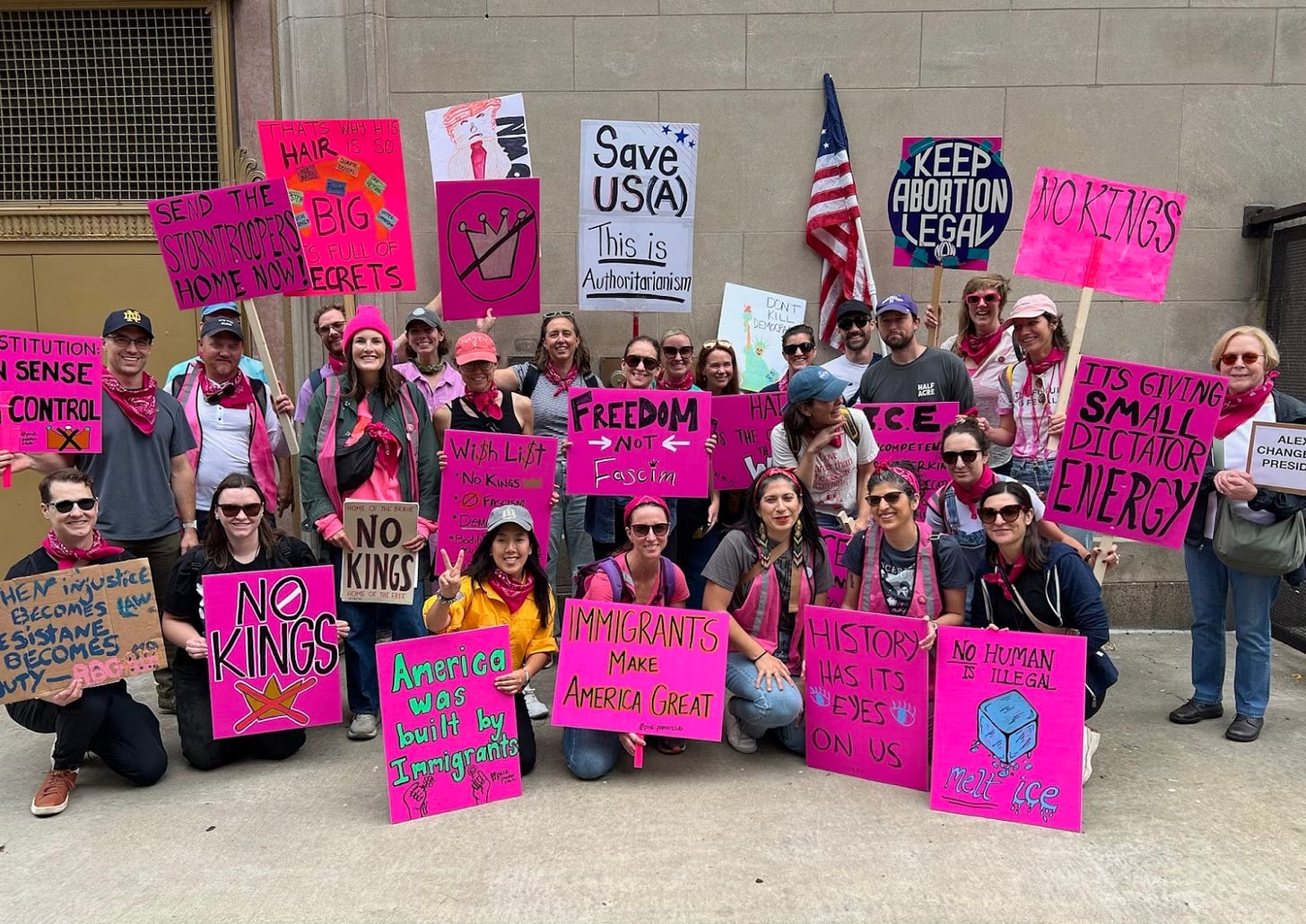
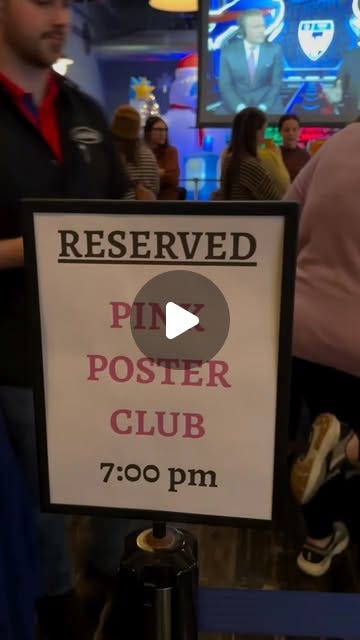
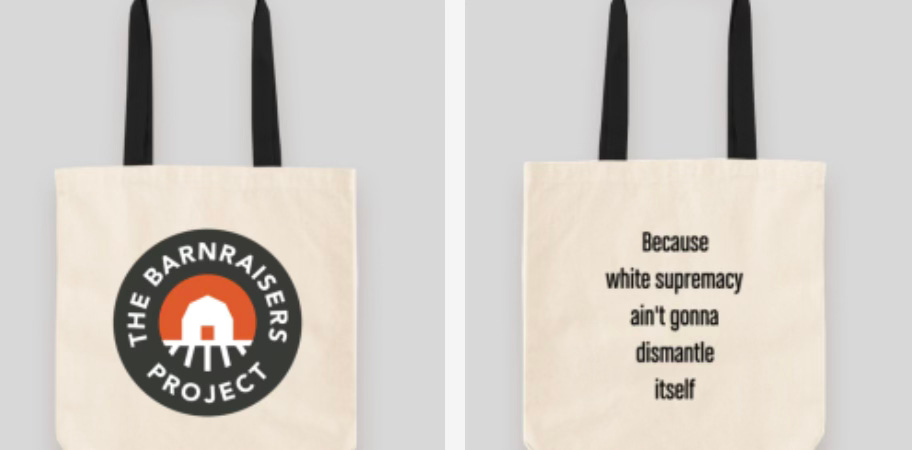
And one more thing: we are building a family compound (long, expensive story, but a leap of faith) and we need to replace the fence surrounding the lot in this gentrifying neighborhood. The (White) neighbors on one side already built a fully opaque, 10' high wooden fence. That just didn't feel right to me: I don't want to be surrounded by walls, I want the wind (and birds, and lizards) to pass through, and **I want to talk to my neighbors** over the fence. Garrett, your work helped me crystalize and articulate what we wanted and why. So we are doing a 4' high fence with hog wire, and a gate--with visions of hosting, wait for it, neighborhood potlucks! I was chatting with our (Black) neighbor on the other side, gave her a heads up that we would need to replace the falling-down fence, and assured her it would allow for conversation. She was like "yeah, doh, of course!"
"Every organizing effort is a leap of faith. There’s no guarantee that anything we try together will actually bear fruit." This. Thanks, I'm going to use this as the opening quote at the next social justice meeting I lead at our UU church.